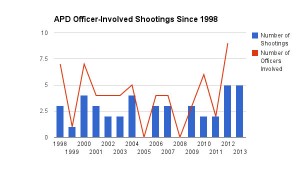 After two years of high profile officer-involved shootings, the Anchorage Police Department has made their use-of-force policy public. Police Chief Mark Mew made the announcement last night, (Thursday 2/13) during a community forum at Clark Middle School in the Mountain View Neighborhood.
After two years of high profile officer-involved shootings, the Anchorage Police Department has made their use-of-force policy public. Police Chief Mark Mew made the announcement last night, (Thursday 2/13) during a community forum at Clark Middle School in the Mountain View Neighborhood.
“The more we dug into it, the more we worked with community groups, the more we started asking ourselves, instead of always trying to explain a policy that we don’t show people, why don’t we just show people the policy.”
In 2013, Mayor Dan Sullivan directed the Anchorage Community Police Relations Task Force to review APD’s use of force policy after an increasing number of officer involved shootings. Reverend, Doctor William Green is the chair of the task force. He says releasing the policy is a step in the right direction.
“That’s good. I mean the public should know about what’s going on in the police department. It’s not top secret.”
The task force made seven recommendations, including making the policy public. There have been ten officer-involved shootings in Anchorage over past two years.The use of force policy, along with the entire 600-page APD policy manual is now available on the department’s web site.
Daysha Eaton is a contributor with the Alaska Public Radio Network.
Daysha Eaton holds a B.A. from Evergreen State College, and a M.A. from the University of Southern California. Daysha got her start in radio at Seattle public radio stations, KPLU and KUOW. Before coming to KBBI, she was the News Director at KYUK in Bethel. She has also worked as the Southcentral Reporter for KSKA in Anchorage.
Daysha's work has appeared on NPR's "Morning Edition" and "All Things Considered", PRI's "The World" and "National Native News". She's happy to take assignments, and to get news tips, which are best sent via email.
Daysha became a journalist because she believes in the power of storytelling. Stories connect us and they help us make sense of our world. They shed light on injustice and they comfort us in troubled times. She got into public broadcasting because it seems to fulfill the intention of the 4th Estate and to most effectively apply the freedom of the press granted to us through the Constitution. She feels that public radio has a special way of moving people emotionally through sound, taking them to remote places, introducing them to people they would not otherwise meet and compelling them to think about issues they might ordinarily overlook.




